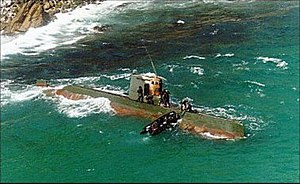Sang-O-class submarine
This article needs additional citations for verification. (August 2010) |
 Submarine involved in the 1996 incident
| |
| Class overview | |
|---|---|
| Builders | Bong Dao Bo Shipyards, Singpo[1] |
| Operators | |
| Preceded by | Yugo class |
| Succeeded by | Sinpo class |
| Subclasses | Attack version, infiltration/reconnaissance version |
| In commission | 1991 |
| Completed | 41+ |
| Active | 40 (February 2021)[2][3] |
| Lost | 1 captured by South Korea |
| Preserved | 1 |
| General characteristics (Sang-O I armed version) | |
| Type | Coastal submarine |
| Displacement |
|
| Length | 34 m (111 ft 7 in) |
| Beam | 3.8 m (12 ft 6 in) |
| Propulsion | Diesel-electric: 1 small diesel, 1 electric motor, 1 shaft |
| Speed |
|
| Range | 1,500 nmi (2,800 km; 1,700 mi) |
| Test depth | 150 m (490 ft), capable of bottoming |
| Capacity | 0 (10/11 in recce version) |
| Complement | 15 |
| Sensors and processing systems |
|
| Armament |
|
| Notes | Fitted with a snorkel |
The Sang-O ("Shark") class of submarines (Hangul: 상어급 잠수함) are diesel-electric coastal submarines in service with the Korean People's Navy, the navy of North Korea.[4] They are the country's second largest indigenously-built submarines.
Though North Korean military capabilities are mostly kept classified, it was reported that North Korea maintains 40 Sang-O-class submarines as of February 2021.[3]
History
[edit]The Sang-O class was introduced in 1991, produced at Bong Dao Bo Shipyards in Sinpo.[4]
A single unit was captured by the Republic of Korea Navy (South Korea) after it ran aground on 18 September 1996 in the Gangneung submarine infiltration incident.[1]
The seized Sang-O-class submarine was placed on display at Unification Park near Gangneung, which was opened on 26 September 2001.[4]
Design
[edit]
The Sang-O class was reported to be larger than a midget submarine, but smaller than the Romeo and Whiskey-class submarines.[5] They are usually equipped with four 533 mm (21 in) torpedo tubes and 16 mines, but some are unarmed and are used to carry North Korean commandos.[6]
New class
[edit]It was reported in March 2011 that a new version of the Sang-O class had been deployed in North Korea.[7] Satellite imagery from 2005 suggests the Sang-O II / K-300 may have been produced at the Mayang-do naval base and fitted out at the dry docks located at 39.9978 N, and 128.20019 E.[8]
Other footage of the nearby docks of Sinp'o appear to depict the Sang-O II / K-300 as early as 2004 (at 40 01'31.20"N 128 09'55.80"E). Subsequent satellite imagery shows the Sang-O II / K-300 deployed to the Ch’aho-rodongjagu submarine Navy Base at 40.205441 N 128.649524 E on North Korea's east coast.[8]
According to the KPA Journal,[2] the decision to develop a larger, improved version of the Sang-O came in the late 1990s or early 2000. The Sang-O II / K-300 is a stretched version of the original Sang-O class with an approximate length of 39 to 40 metres and a corresponding surface displacement of approximately 300 to 340 tons.
The increased length and internal volume would suggest an increase in the operational range of the submarine and troop/equipment carrying capabilities. Top speed is also reported to be higher in the new model, meaning an improved propulsion system is possibly housed in some of the extra length.
References
[edit]- ^ a b Miller 2003, p. 472.
- ^ a b "N.Korea Builds up Submarine Force" (PDF). The Chosun Ilbo. 21 March 2011.
- ^ a b "North Korea Submarine Capabilities | NTI".
- ^ a b c "SSC Sang-o Class". GlobalSecurity.org.
- ^ "SANG-O-class SSM | Military Periscope".
- ^ "Asia's Submarine Race". 13 November 2013.
- ^ Joseph S. Bermudez Jr. (21 March 2011). "KPN deploys new version of Sang O class Coastal Submarine". KPA Journal.
- ^ a b "South Korea releases details of North Korea coastal submarine". 25 April 2011.
Bibliography
[edit]- Miller, David, ed. (2003). Illustrated Directory of Special Forces. St. Paul, Minnesota: Salamander Books. ISBN 978-0760314197.
